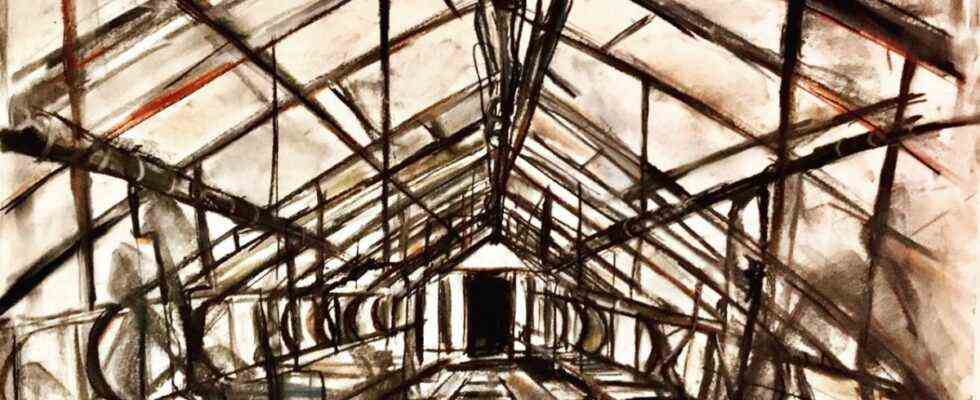Dachau has many places where you can encounter art: ancient art, for example, in the picture gallery, and works by today’s artists can be found in public places such as Dachau Castle, in artist studios and galleries. One of these places is the Dachau Forum: Four times a year, Alfred Ullrich presents an exhibition here on behalf of the Forum. The Dachau Forum is currently showing works by the artist Mette Therbild, who lives in Haimhausen.
Born in Denmark, who studied fine arts and art history at the Art College in Oxford, England, is a fixture in Haimhausen’s cultural scene: she teaches painting and drawing at the adult education center and schools and has also been hosting the art event for ten years “Haimhauser Art” organized for the Haimhauser Kulturkreis. Therbild has repeatedly shown her own work in Dachau, including in the water tower or in the KVD gallery, of which she is a member.
It is no coincidence that Mette Therbild is now exhibiting drawings and paintings in the Dachau Forum. “Remembrance work is one of our core issues,” says the forum’s managing director, Annerose Stanglmayr. And for Therbild too, remembering the terror of the Nazi dictatorship has become a “core issue”. In 2018 she trained to be a speaker for memorial work and has been offering English-language tours of the Dachau memorial ever since.
The theme of remembering has also found its way into her artistic work. Most of the pictures that can now be seen in the Dachau Forum have their origins in a visit to the former “herb garden” – a glossy name for a plantation in which prisoners of the concentration camp had to do hard labor. Today there are still buildings on the site, in particular several skeletons of old greenhouses that are in great danger of decay.
Therbild’s works clearly reflect that this is a place of suffering and systematic brutality.
Image: private
Your art is a contribution to the culture of remembrance.
Image: private
As part of a large-scale program, medicinal herbs in particular were to be grown and the local production of vitamin-giving plants to be experimented with. Mette Therbild was able to visit the area closed to the public with a special permit. She drew, took a lot of photographs and, above all, let the atmosphere of the place sink in for many hours. It must have been very strong impressions that the artist took with her. “Like skeletons,” says Therbild, the structures that still exist in the greenhouses are a reminder of what happened here, while at the same time the rampant nature is in stark contrast to it.
In her work, it is fundamentally important, according to Therbild, to “artistically implement what has been seen, heard, remembered and felt” and to make it accessible to others. She did an excellent job of doing the work on the herb garden. On the one hand, there are works with a strong graphic and factual orientation, which, using charcoal or mixed media, show what is still there of the structures of the glasshouses.
The artist Mette Therbild.
(Photo: Toni Heigl)
On the other hand, there are also images in which the past of the place becomes present: in the midst of lush nature, shadowy people are visible who have done slave labor here and are still present in a certain way. The memory of what happened here must absolutely be preserved, says Therbild, and the restoration of the site, which has been discussed for years, must therefore be implemented.
In addition to the cycle of herb garden pictures, Mette Therbild also shows other things in the Dachau Forum: oil paintings, for example in various formats, in which her Danish homeland, mostly highly abstract, plays an important role. The yellow of the grain fields, the blue of the wide sky above or the blue of the sea are visible in strongly atmospheric color compositions.
But Nordic myths also play a role in Therbild’s work: Odin, with a horse’s head and accompanying raven, looks seriously at the viewer. In other pictures, powerful brush strokes in a vortex suggest mysterious cave entrances or breakthroughs to a light center. Just as in the works in which the herb garden is the focus, nature is shown here in all its many facets: It can be threatening or full of unquestioned beauty – and is always an expression of the feelings and fantasies of the woman who she is banishes on the canvas.
Mette Therbild’s work can be seen in the Dachauer Forum until January 18, 2022. The exhibition is open during the forum’s business hours, Monday to Friday from 9 a.m. to 12 p.m., and Monday and Thursday afternoons from 1 p.m. to 4 p.m.

